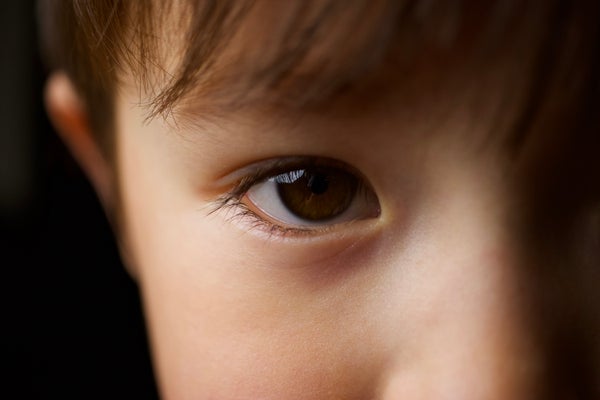Have you ever guessed what dish your significant other would order at a restaurant before they even picked up the menu? If so, congratulations, you’ve engaged in a behavior that some researchers believe might be “uniquely human.”
In a new paper, published today in PLOS ONE, a team of scientists found that young children from diverse cultural backgrounds have the ability to anticipate other peoples’ food preferences—but nonhuman great apes do not. “It’s a question of social cognition,” says Juliane Kaminski, a comparative psychologist at the University of Portsmouth and a co-author of the study. “We are basically asking about theory of mind.”
“Theory of mind” refers to an individual’s ability to understand that others have emotions, thoughts and desires that are unique from their own. There is a long-standing debate over whether theory of mind is a distinctly human capability or one that other species, including our closest primate relatives, have as well. More recently, scientists have also begun researching how children first develop theory of mind and whether the cultural context in which a person is raised changes this benchmark.
In order to probe both of these questions, Kaminski and her co-authors recruited 71 children from three different countries: Samoa, Namibia and Germany. They also tracked down 25 captive great apes representing the four species most closely related to humans: bonobos, chimpanzees, orangutans and gorillas. Then the researchers ran both groups through a test that involved three food choices, which the team ranked from most to least desirable. Unlike previous theory of mind studies, the researchers designed their test for nonverbal participation, allowing the apes to perform the same task as the children.
First, they pitted the human children against adult volunteers. The adult participants were instructed to express a preference for the food option that was the children’s favorite (in this case, chocolate) and then, in another round, for the children’s least favorite (dried tomatoes). When the adults expressed desire for the tomatoes, the kids chose the chocolate without hesitation. But when the adults conveyed a preference for the candy, the children almost uniformly opted for their second choice (crackers) so that the grown-ups could enjoy the sweet treat—and the kids could be certain of getting at least some reward while avoiding the dreaded tomatoes. This pattern held across each of the three cultural backgrounds.
Great apes, however, showed no such courtesy. When the researchers ran a similar food preference test with chimpanzees, bonobos, gorillas and orangutans, they found that the primates did not take the desires of human volunteers into account. Regardless of the human participants’ preference, most of the great apes reached for their preferred food (bananas or pasta) over their least favorite (radishes). A few opted out of choosing, but none picked the unappetizing food.
To the study’s authors, this demonstrated clearly that theory of mind develops in roughly the same way across human cultures and remains absent from apes. “It obviously did confirm the idea that understanding what others are thinking is a human trait,” Kaminski says.
Some researchers are a bit skeptical about whether this truly disproves apes’ capacity to take on other perspectives, however. “I think it’s a mistake to assume that ‘theory of mind’ refers to one unitary construct,” says Henry Schlinger, a behavioral psychologist at California State University, Los Angeles, who was not involved in the study. Since it was coined, the phrase has been used to refer to a wide range behaviors and tendencies, including the ability to express empathy, anticipate unexpected outcomes and parse nuanced sentences. Just because a chimpanzee doesn’t want to share food with humans doesn’t mean it can’t empathize with members of its group.
What’s more, Schlinger would have liked to see the researchers apply the test to younger, preverbal children. All of the kids in the study were between five and 11 years old. By that point, they would have acquired linguistic and problem-solving skills far beyond that of any ape.
Schlinger found the paper’s cross-cultural and interspecies comparisons valuable, however. “I think that is definitely a plus of this study,” he says. Historically, the bulk of theory of mind studies have tended to focus on children from Westernized countries, particularly the U.S. Because of this, childhood development in the U.S. came to be seen as universal—even though it isn’t.
By taking a more inclusive look across cultures, Kaminski and her team helped establish that kids anticipating other peoples’ choices isn’t just a “Western” thing—it’s a human one. Kaminski hopes that in the future other researchers will investigate how theory of mind develops in children from an even broader spectrum of backgrounds and social contexts. “I think that would be really great,” she says.
